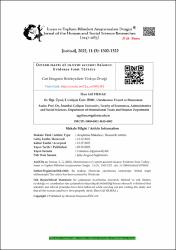| dc.contributor.author | Yılmaz, Ebru Gül | |
| dc.date.accessioned | 2024-01-08T02:29:49Z | |
| dc.date.available | 2024-01-08T02:29:49Z | |
| dc.date.issued | 2022 | en_US |
| dc.identifier.issn | 2147-1185 | |
| dc.identifier.uri | https://hdl.handle.net/11363/6895 | |
| dc.description.abstract | Current account balance, which is followed by all governments and policymakers, is one
of the most critical macroeconomic indicators that can affect all dynamics of a country’s
general economic environment from different aspects, such as inflation, foreign exchange
rates and employment. There is not any consensus on the determinative factors of the
CAB-Current account balance in the literature. Actually, the fact that there isn’t any
consensus on the determinative factors of the CAB can be accepted as a natural result of the different structures of each country. Most worldwide studies have focused on just
sectoral or just macro indicator-based determinants. With the motivation of taking both
sectoral and macroeconomic conditional effects on the current account balance, the
theoretical model was set as CAB as the dependent variable and ‘inflation’, ‘foreign direct
investments’, ‘export to import ratio’, ‘tourism income’, and ‘growth’ as independent
variables. The reason behind choosing tourism as the only sector is the compensation
power of the tourism sector on the foreign trade deficit. With the data available for all
variables, the time span of this paper was 2008-2019 by using the “ARDL” bounds
methodology. The findings showed that there was a long-run and statistically significant
positive relationship between the CAB and all independent variables of the model where
just foreign exchange appreciation has a negative effect. It is thought that the model
established in our research contributes to the literature in terms of including a
combination of both macro data and sectoral data on the determinants of the current
balance in Turkey. | en_US |
| dc.description.abstract | Tüm hükümetler ve politikacılar tarafından önemsenen cari işlemler dengesi, bir ülkenin
genel ekonomik yapısının, enflasyon, döviz kurları, istihdam gibi farklı dinamiklerini
etkileyebilecek en kritik makro ekonomik göstergelerden biridir. Literatürde cari işlemler
dengesinin belirleyicileri konusunda fikir birliğine varılamamıştır. Öte yandan çoğu
çalışma sadece sektörel ya da sadece makro gösterge temelli belirleyicilere odaklanmıştır.
Hem sektörel hem de makro belirleyicileri bir modelde toplama motivasyonu ile teorik
modelde bağımsız değişkenler; “enflasyon”, “doğrudan yabancı yatırımlar”, “ihracatın
ithalatı karşılama oranı”, “büyüme” ve “turizm gelirleri” olarak belirlenmiştir. Tüm
değişkenlere ait verilerin bir arada temin edilebildiği dönem olması gerekçesiyle 2008-
2019 dönemi için çalışma gerçekleştirilmiş, yetersiz veri adedi sorunun aşılabilmesi için
ise aylık veri kullanıl ve “ARDL”- Otoregresif Dağıtılmış Gecikme Modeli, tercih
edilmiştir. Çalışmanın sonuçlarına göre belirlenen tüm bağımsız değişkenler ve cari
işlemler dengesi arasında istatistiki olarak anlamlı ve uzun vadeli ilişkinin varlığı
kanıtlanmıştır. Elde edilen bulgular, cari işlemler dengesi ile modelin 'turizm geliri',
'döviz kuru', 'enflasyon', 'büyüme' ve ' ihracatın ithalatı karşılama oranı' tüm bağımsız
değişkenler arasında uzun dönemde ve istatistiksel olarak anlamlı bir ilişki olduğunu
göstermiştir. Elde edilen sonuca göre bağımsız değişkenlerdeki %1 oranındaki artışların
cari denge üzerindeki etkileri şu şekilde belirlenmiştir: net turizm geliri/GSYİH %1,35'lik
artışa, DYY %0,88'lik artışa, enflasyon %0,48'lik artışa, ihracatın ithalatı karşılama oranı
%0,32'lik büyüme %0.047'lik artışa, döviz kuru artışındaki %1'lik artış ise cari işlemler
dengesinde %0.89'luk düşüşe neden olmaktadır. Cari denge belirleyicilerinin, her ülkenin
kendi dinamiklerine göre farklılık göstereceği açıktır. Araştırmamızda kurulan modelin,
cari denge belirleyicilerinin Türkiye özelinde hem makro veriler hem de sektörel verilerin
bir kombinasyonunu içermesi açısından literatüre katkı sunduğu düşünülmektedir. | en_US |
| dc.language.iso | eng | en_US |
| dc.publisher | Mustafa Süleyman Özcan | en_US |
| dc.relation.isversionof | 10.15869/itobiad.1078024 | en_US |
| dc.rights | info:eu-repo/semantics/openAccess | en_US |
| dc.subject | Current account balance | en_US |
| dc.subject | Tourism | en_US |
| dc.subject | FDI | en_US |
| dc.subject | Inflation | en_US |
| dc.subject | Growth | en_US |
| dc.subject | “ARDL” | en_US |
| dc.subject | Cari İşlemler Dengesi | en_US |
| dc.subject | Turizm | en_US |
| dc.subject | DYY | en_US |
| dc.subject | Enflasyon | en_US |
| dc.subject | Büyüme | en_US |
| dc.subject | “ARDL” (Otoregresif Dağıtılmış Gecikme Modeli) | en_US |
| dc.title | Determinants of current account balance : Evidence from Türkiye | en_US |
| dc.title.alternative | Cari Dengenin Belirleyicileri: Türkiye Örneği | en_US |
| dc.type | article | en_US |
| dc.relation.ispartof | İnsan ve Toplum Bilimleri Araştırmaları Dergisi | en_US |
| dc.department | İktisadi İdari ve Sosyal Bilimler Fakültesi | en_US |
| dc.authorid | 0000-0002-3610-4982 | en_US |
| dc.identifier.volume | 11 | en_US |
| dc.identifier.issue | 3 | en_US |
| dc.identifier.startpage | 1302 | en_US |
| dc.identifier.endpage | 1322 | en_US |
| dc.relation.publicationcategory | Makale - Ulusal Hakemli Dergi - Kurum Öğretim Elemanı | en_US |
| dc.contributor.institutionauthor | Yılmaz, Ebru Gül | |

















